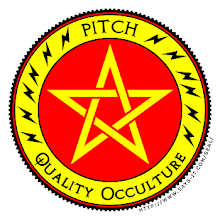My chief concerns have to do with Neo-Paganism, and with supporting Neo-Pagan Craft as an autonomous spirituality movement. I favor sustaining the distinctive principles and qualities of
Craft.
In my earlier blog post, I focused on the differences between Neo-Pagan Craft tenets and philosophy and those of creedal Christianity. I think that they are different, and so different that the tenets and philosophies do not mix easily or well. That's an intellectual, discursive conclusion.
My intellectual conclusion about mixing tenets, however, does not address the entirety of Christianity, nor the effects of direct mystical experiences, nor all the ways that folks mix Christianity with Craft.
Coming from the Neo-Pagan Craft corner, I think that it's doable to include aspects of Christianity into a Craft practice. Neo-Paganism offers a meta-pantheon that is, in principle, complete and exhaustive. A practitioner may work with the Deity or figures from Christianity in much the same way as with Deities and figures from any other pantheon.
But I still think that doing this brings along some cognitive dissonance that working with other pantheons probably doesn't. As a polytheist, monotheism in my working meta-pantheon gets scratchy. It hinders my enterprise.
Christianity is such a huge cluster of denominations that an adherent can take up just about anything and still qualify as *Christian* somewhere. So, yes, an adherent could be a *Christian* and a *Witch.* An adherent could put together a framework that sheltered the two together.
But it looks to me like this wouldn't work at all in any of the Creedal denominations of Christianity. And if what I'm reading in this blog carnival about some of the other denominations,
which may give less weight to creeds, identifying as *Pagan* causes difficulties and rejection among some Christian-identified adherents of those denominations. Pagans are not considered adequately *serious* about the *Christianity* they also claim.
There's no answer to this dilemma. Some folks feel strongly enough about holding to the values, practices, or values of these Christian (but not creedal) denominations that they put up with criticism of their sincerity and doubts over their expressed faith.
My only concern in these cases--and it's a minor one--involves what compromises these folks might make vis a vis Craft in order to demonstrate that they are *real* Christians in the eyes of their critics.
Taking part in this blog carnival has reminded me of another dimension where practitioners may mix up Christianity and Craft--direct mystical experiences of Deities or Guardians or entities from the Neo-Pagan meta-pantheon, or of a Deity or figures from the Christian pantheon. (It's tricky for a polytheist to talk about the monotheistic Christian pantheon, recognizing that in terms of that pantheon most entities are not the one recognized Deity but demi-deities or sanctified humans.)
Mystical experiences have all sorts of revelatory, illuminating, wisdom-uncovering, profoundly connecting, or dissolving into oneness effects. In trying to convey these effects, or how they came about, or why they energize transformation, or other qualities and insights, a practitioner may turn to any means to hand. Such a means to hand may be a familiar Christian vocabulary and set of notions. Especially if that practitioner grew up around that vocabulary and set of notions, or if it was an important aspect of that practitioner's spirituality, or if it is currently an active part of that practitioner's Pagan/Christian mix.
In these cases, all bet's are off. It's probably uncharitable to point out intellectual disagreements or philosophical discords when a practitioner is talking about her or hsi mystical experiences. they
are putting a far more spiritual and poetic vocabulary into play, one that hints more and denotes less. They may not care at all that some term they've used to circumambulate ineffable wholeness reverberates with--in a more ordinary language--creedal Christian implications. Implications dissonant to my Crafty Neo-Pagan ears, for instance.
Still, I'm concerned about even a mystical vocabulary drawing on Christian terms whose philosophical implications include references to tenets that don't mix well with Neo-Pagan Craft. Others, reading or hearing those Christian terms may not be moved by the mystical experiences that overwhelmed those implications for the practitioner who uttered them. I favor using a different vocabulary, drawing on terms from sources that don't organize around a dynamic of sin, salvation from sin, and discovering the optimum agency or salvation.
It does matter what words we choose, what they denote, what they imply, and whether we believe that some words advance conversation while others stifle it.
Subscribe to:
Post Comments (Atom)


1 comment:
I'm suddenly thinking about the end of Young Frankenstein when young Frankenstein is asked by his new wife what the monster gave him.
Christian leaders are as worried as you are. Their fear is that their cherished dogma will suddenly dissolve into some syncretist stew and they'll lose everything. If you followed any of the conservative fulminations about the former Episcopal priest and current druid Bill Melnyk, you'll see that they're running absolutely scared.Meditation groups have spun up in churches all over the country. Christian reiki is here to stay!
I've personally believed that Christianity cut off a limb in order to save itself in the early centuries and that limb was direct revelation. We've got it and they don't or if they do, they put it through a theological meat grinder to make it appear like sausage.
We've got direct revelation in spades. But all our cooking is based on free-form tarts and so Jesus and Christ appear around the edges and sometimes in the middle.
So, if the Christians get reiki what do we get? I hope we duck the command and control stuff. They can keep all the fear that they want on their side of the moat. What I would hope for is that we get more compassion - a drive to look outward as well as inward.
peace and health,
david
/|\
Post a Comment